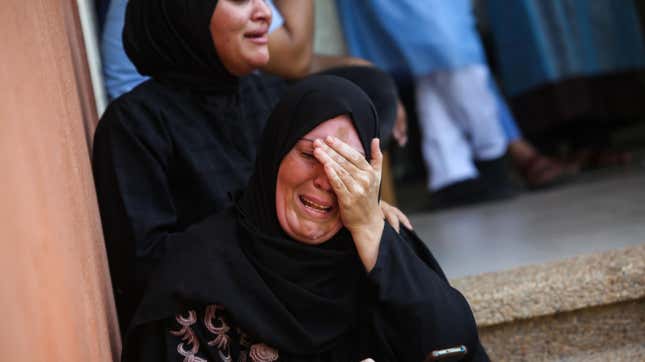Miscarriages in Gaza Have Increased 300% Under Israeli Bombing
Humanitarian agencies say women and menstruating people are also facing alarming rates of severe infections due to Israel's blockade of supplies and water.
In Depth

At Al-Emirati Hospital in Rafah, a woman identified by Doctors Without Borders as Maha sought a delivery room as she began going into labor, but was denied: “All the delivery rooms were full,” an emergency coordinator working with the humanitarian group recounted in a news release published Wednesday. Maha “knew something wasn’t right,” and that she needed care. But without other options, she returned to her tent. Her newborn son died as she gave birth to him in the bathroom near her tent. “Without this war, she would not have lost her son,” the emergency coordinator wrote.
Shortly after Israel’s bombardment of the Gaza Strip began in October, global health groups raised alarms that there was no longer anywhere safe for pregnant women to give birth. More than three months into the siege, conditions have only worsened, and pregnant and menstruating people are especially at risk. Health care workers report a 300% increase in the miscarriage rate among pregnant people in Gaza since Israel’s attacks began three months ago, Nour Beydoun, CARE’s regional advisor on protection and gender in emergencies, told Jezebel.
The lack of supplies due to Israel’s ongoing blockade has resulted in pregnant women struggling to carry healthy pregnancies; higher risk of infection and death after giving birth or having c-sections; increased infant mortality; and a range of other deadly sexual and reproductive health outcomes. Beydoun told Jezebel that CARE has heard about “significant weight loss” among pregnant women “due to the limited access to food, to proper nutrition,” resulting in “poor personal health and also in poor fetal and newborn health.”
Ammal Awadallah, executive director of the Palestinian Family Planning & Protection Association, told Jezebel that “all pregnant women are now at severe risk of delivering in unsafe conditions, being put in situations where they are giving birth in cars, tents, and shelters.” At health centers, pregnant women are only admitted “when fully dilated and are dismissed within a few hours after giving birth, due to the overcrowded facilities and extremely limited resources.” On top of all this, Beydoun said that many women must make the journey to hospitals or health centers—where they could still be turned away due to lack of capacity—on foot.
-

-

-

-

-

-

-

-

-

-

-

-

-

-

-

-

-

-

-

-

-

-

-

-

-

-

-

-

-

-

-

-

-

-

-

-

-

-

-

-









































